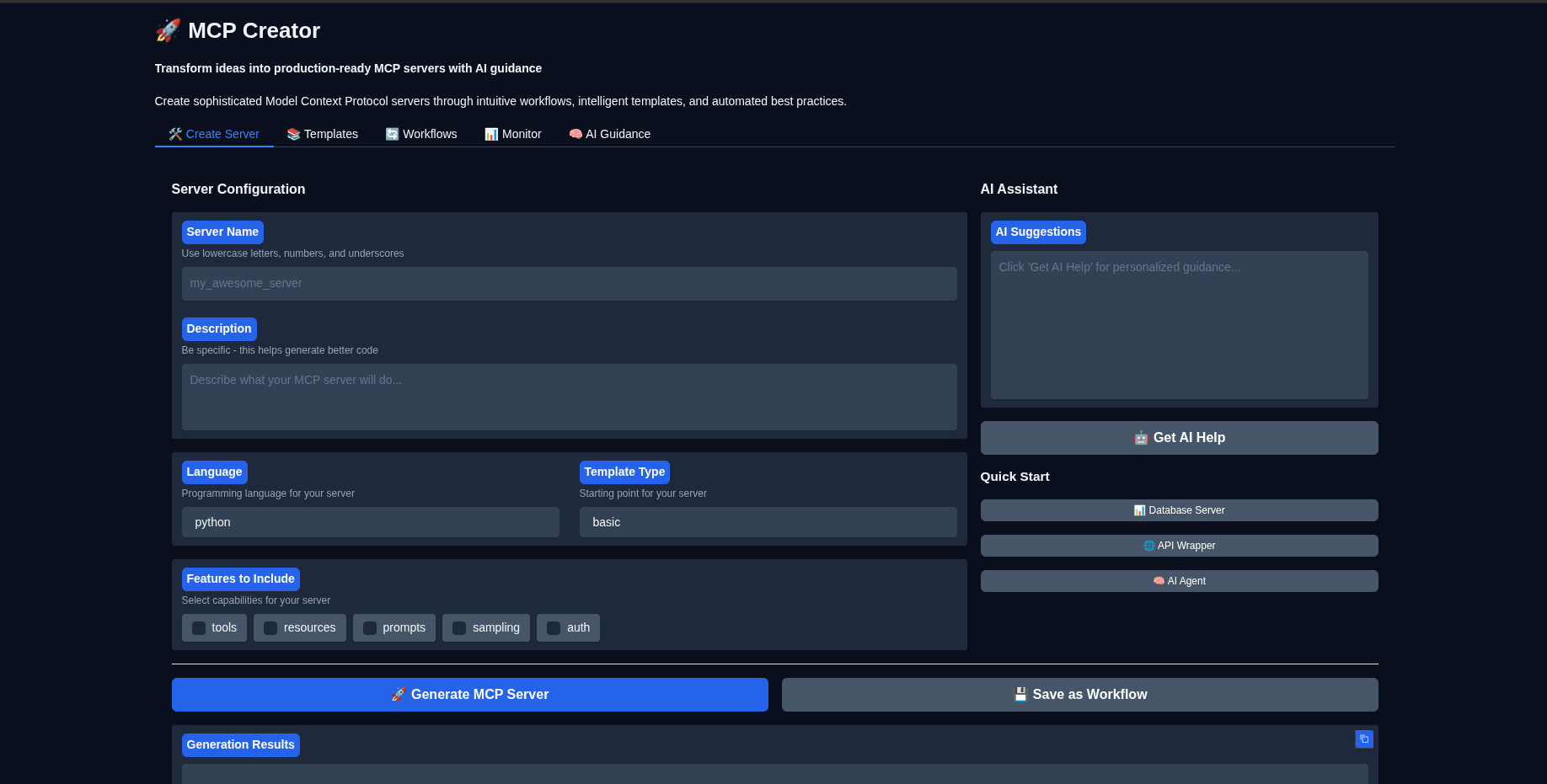Uses .ENV files for configuration management and storing sensitive credentials
Provides GitHub integration for issues, discussions, and wiki documentation
Provides a user-friendly web interface for visual server management and offers Gradio interface templates
Uses Jinja2 for template rendering when creating custom MCP servers
Integrates with Ollama's local AI models to provide AI guidance for MCP server creation
Integrates with OpenAI's API via an API key to provide AI guidance for MCP server creation
Offers Python-based MCP server templates and multi-language support for server creation
Click on "Install Server".
Wait a few minutes for the server to deploy. Once ready, it will show a "Started" state.
In the chat, type
@followed by the MCP server name and your instructions, e.g., "@MCP-Creator-MCPhelp me create a weather data MCP server with Python"
That's it! The server will respond to your query, and you can continue using it as needed.
Here is a step-by-step guide with screenshots.
MCP-Creator-MCP 🚀
A meta-MCP server that democratizes MCP server creation through AI-guided workflows and intelligent templates.
Transform vague ideas into production-ready MCP servers with minimal cognitive overhead and maximum structural elegance.
🎯 Vision
Creating MCP servers should be as simple as describing what you want. MCP Creator bridges the gap between idea and implementation, providing intelligent guidance, proven templates, and streamlined workflows.
Related MCP server: MCP Maker
✨ Core Features
🤖 AI-Guided Creation: Get intelligent suggestions and best practices tailored to your use case
📚 Template Library: Curated collection of proven MCP server patterns
🔄 Workflow Engine: Save and reuse creation workflows for consistent results
🎨 Gradio Interface: User-friendly web interface for visual server management
🔧 Multi-Language Support: Python, Gradio, and expanding language ecosystem
📊 Built-in Monitoring: Server health checks and operational visibility
🛡️ Best Practices: Automated validation and security recommendations

🚀 Quick Start
Prerequisites
Python 3.10 or higher
uv package manager
Claude Desktop (for MCP integration)
Installation
Basic Usage
Option 1: As an MCP Server (Recommended)
Configure Claude Desktop:
# Copy the example config cp example_mcp_config.json ~/path/to/claude_desktop_config.json # Edit paths and API keys as neededStart using in Claude Desktop:
Restart Claude Desktop
Use tools like
create_mcp_server,list_templates,get_ai_guidance
Option 2: Standalone Interface
📖 Configuration
Environment Variables
Create a .env file with your settings:
Claude Desktop Integration
Edit your Claude Desktop config (usually at
~/.config/Claude/claude_desktop_config.json):
Restart Claude Desktop
🛠️ Usage Examples
Creating Your First MCP Server
Getting AI Guidance
Managing Templates
🏗️ Architecture
Core Principles
Simplicity: Each component has a single, clear responsibility
Predictability: Consistent patterns reduce cognitive load
Extensibility: Modular design enables easy customization
Reliability: Comprehensive error handling and graceful degradation
Component Overview
📚 Template System
Available Templates
Python Basic: Clean, well-structured foundation
Python with Resources: Database and API integration patterns
Python with Sampling: AI-enhanced server capabilities
Gradio Interface: Interactive UI with MCP integration
Creating Custom Templates
Templates use Jinja2 with clean abstractions:
🔄 Workflow System
Saving Workflows
🔧 Development
Project Structure
The codebase follows clean architecture principles:
Separation of Concerns: Each module has a single responsibility
Dependency Injection: Components are loosely coupled
Error Boundaries: Graceful failure handling throughout
Type Safety: Comprehensive type hints and validation
Adding New Templates
Create template directory:
templates/languages/{lang}/{name}/Add
metadata.jsonwith template configurationCreate
template.{ext}.j2with Jinja2 templateTest with the template manager
Contributing
Fork the repository
Create a feature branch with descriptive name
Follow the existing code patterns and style
Add tests for new functionality
Submit a pull request with clear description
🛡️ Security & Best Practices
Built-in Protections
Input Validation: All user inputs are validated and sanitized
Process Management: Proper cleanup prevents resource leaks
Error Handling: Graceful failure with helpful messages
Logging: Comprehensive operational visibility
Recommended Practices
Use environment variables for sensitive data
Implement rate limiting for production deployments
Regular security audits of generated servers
Monitor server performance and resource usage
🐛 Troubleshooting
Common Issues
Server won't start:
Claude Desktop integration:
Template errors:
📊 Monitoring & Operations
Health Checks
The server provides built-in health monitoring:
Resource usage tracking
Error rate monitoring
Performance metrics
Template validation
Logging
All operations are logged to stderr (MCP compliance):
🚀 What's Next?
Multi-language expansion: TypeScript, Go, Rust templates
Cloud deployment: Integration with major cloud platforms
Collaboration features: Team workflows and template sharing
Advanced AI: Enhanced code generation and optimization
Marketplace: Community template and workflow ecosystem
📝 License
MIT License - see LICENSE for details.
🤝 Contributing
We welcome contributions! Please see CONTRIBUTING.md for guidelines.
💬 Support
Issues: GitHub Issues
Discussions: GitHub Discussions
Documentation: Wiki
Built with ❤️ for the MCP community
MCP Creator makes sophisticated AI integrations accessible to everyone, from hobbyists to enterprise teams.